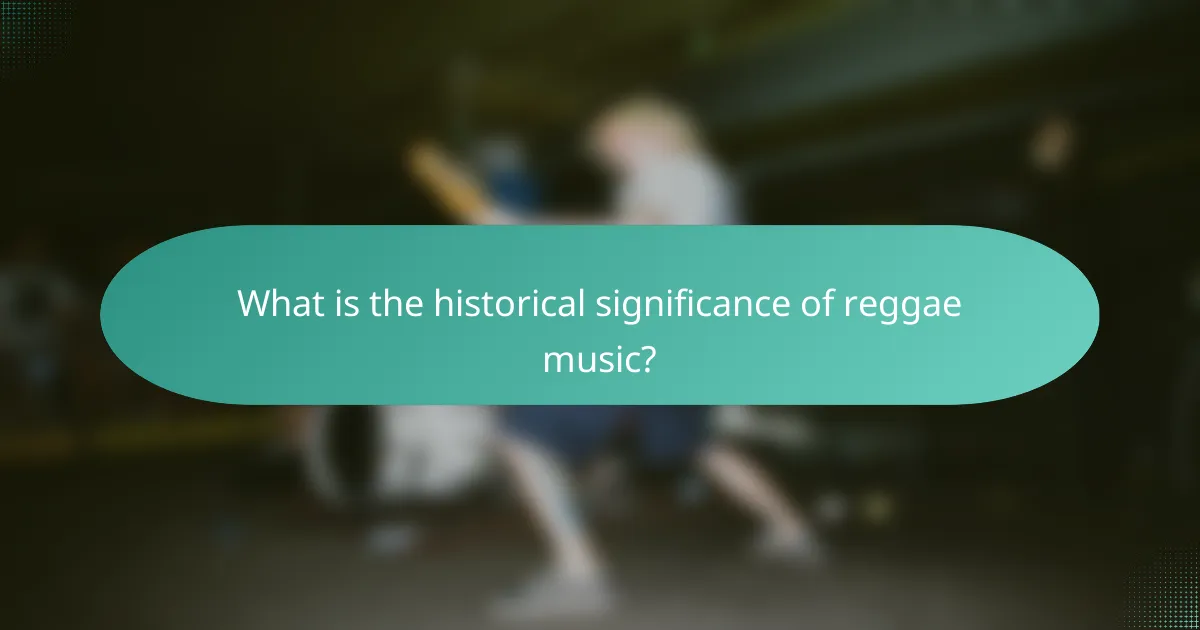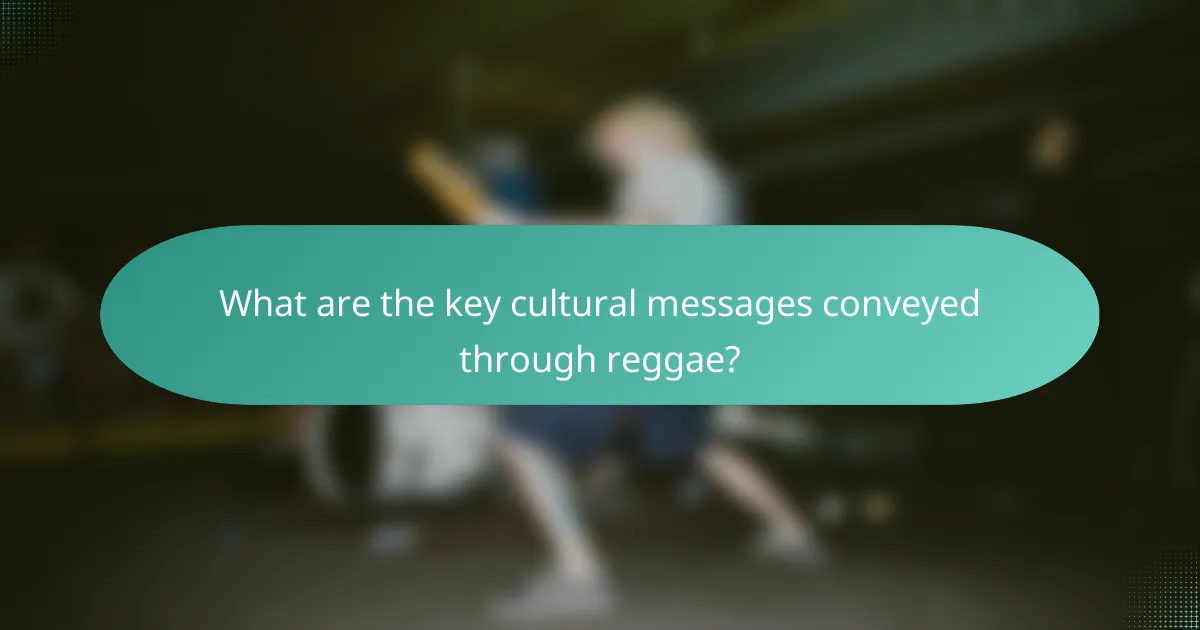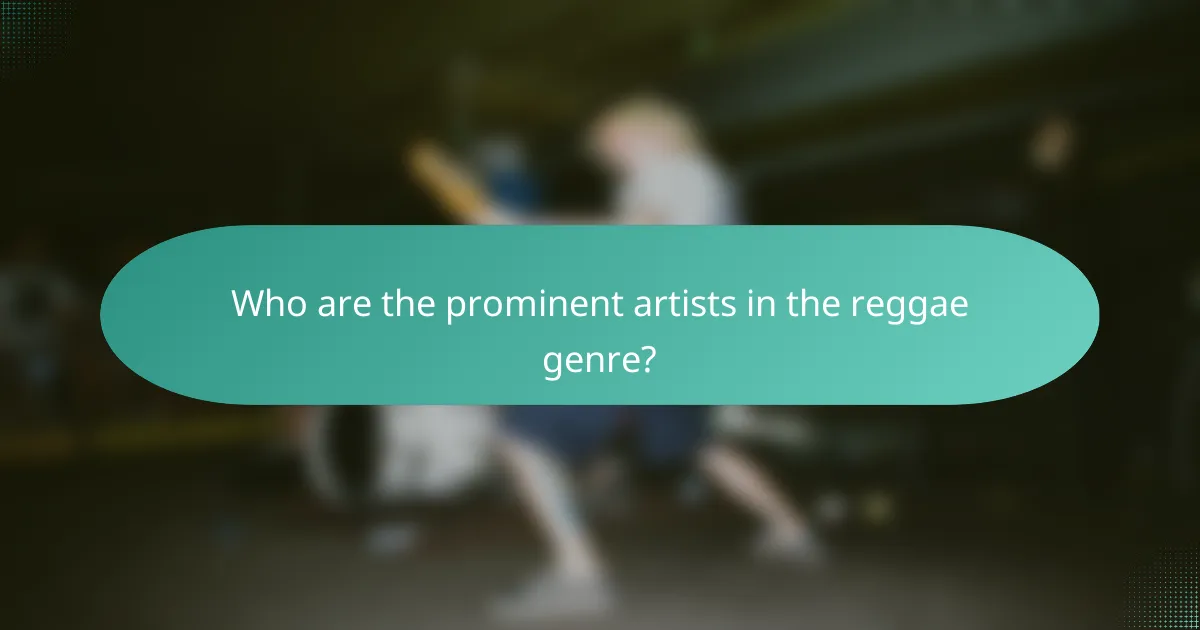Reggae music is a genre that originated in Jamaica in the late 1960s, known for its significant role in promoting social change and cultural identity. It serves as a voice for marginalized communities, addressing issues such as poverty, oppression, and inequality through its lyrics. Prominent artists like Bob Marley, Peter Tosh, and Jimmy Cliff have played crucial roles in popularizing reggae and conveying messages of resistance, unity, and social justice. Reggae’s connection to Rastafarianism further enriches its cultural significance, while festivals like Reggae Sumfest celebrate its heritage. The genre’s influence extends globally, inspiring movements for change and impacting various music styles.

What is the historical significance of reggae music?
Reggae music is historically significant for its role in promoting social change and cultural identity. Originating in Jamaica in the late 1960s, it became a voice for the marginalized. The genre reflects the struggles against oppression and inequality. Artists like Bob Marley popularized reggae globally, highlighting themes of resistance. Reggae’s connection to Rastafarianism further emphasizes its cultural roots. The music often addresses issues like poverty, violence, and human rights. Reggae festivals, such as Reggae Sumfest, celebrate this rich heritage. Overall, reggae music has influenced various genres and continues to inspire movements worldwide.
How did reggae music originate and evolve over time?
Reggae music originated in Jamaica in the late 1960s. It evolved from earlier genres such as ska and rocksteady. Reggae features a distinctive rhythmic style characterized by offbeat guitar strumming and a strong bass line. The genre was heavily influenced by Rastafarian culture, which promoted social and spiritual themes. Bob Marley emerged as a prominent figure, popularizing reggae globally in the 1970s. The music often addresses issues like poverty, oppression, and love. Over time, reggae diversified into subgenres such as dancehall and roots reggae. The genre continues to influence artists worldwide, maintaining its cultural significance.
What cultural influences shaped the development of reggae?
Reggae developed through various cultural influences, primarily Rastafarianism, African heritage, and Jamaican folk music. Rastafarianism introduced themes of social justice and [censured], shaping reggae’s lyrical content. African heritage contributed rhythms and instruments, establishing a unique sound. Jamaican folk music, including mento and ska, provided foundational musical styles. The fusion of these elements created reggae’s distinct identity. Historical events, like the struggles for independence in Jamaica, further influenced its evolution. Music legends, such as Bob Marley, popularized these cultural influences globally.
How did socio-political events impact the evolution of reggae?
Socio-political events significantly influenced the evolution of reggae music. The genre emerged in Jamaica during the late 1960s amid political turmoil and social unrest. The rise of Rastafarianism, a spiritual and cultural movement, shaped reggae’s themes of resistance and empowerment. The assassination of political figures and social inequality fueled lyrics addressing injustice and oppression. The 1970s saw reggae gain international recognition, partly due to the political climate in Jamaica. Artists like Bob Marley used their platform to advocate for peace and unity during times of conflict. Reggae also responded to global issues, reflecting struggles against colonialism and racism. Events such as the Jamaican elections of 1976 intensified the genre’s political messages. Overall, socio-political contexts provided reggae with its identity and purpose, making it a voice for the marginalized.
What role did reggae play in social and political movements?
Reggae played a significant role in social and political movements, particularly in Jamaica and beyond. It emerged as a voice for the oppressed, addressing issues like inequality and injustice. Artists like Bob Marley used their music to promote messages of resistance and unity. Songs such as “Get Up, Stand Up” became anthems for civil rights movements. Reggae’s roots in Rastafarian culture also contributed to its political significance. The genre often criticized colonialism and advocated for Pan-Africanism. In the 1970s, reggae influenced global movements, inspiring activists worldwide. Its rhythms and messages fostered solidarity among marginalized communities.
How has reggae been used as a tool for activism?
Reggae has been used as a tool for activism by addressing social and political issues through its lyrics. Artists like Bob Marley have highlighted themes of resistance, oppression, and unity. Songs such as “Get Up, Stand Up” call for social justice and human rights. The genre emerged in Jamaica during the 1960s, reflecting the struggles of marginalized communities. Reggae music has often served as a voice for the voiceless. It raises awareness about issues like poverty, inequality, and violence. Festivals and events promote reggae as a platform for activism. Overall, reggae’s cultural messaging has inspired movements for change worldwide.
What messages of resistance are commonly found in reggae lyrics?
Reggae lyrics commonly convey messages of resistance against oppression and injustice. These messages often address social, political, and economic struggles faced by marginalized communities. Reggae artists frequently highlight themes of anti-colonialism, civil rights, and the fight against systemic inequality. For example, Bob Marley’s “Get Up, Stand Up” calls for empowerment and action against oppression. Additionally, songs often reference Rastafarian beliefs, promoting unity and resilience against adversity. The genre serves as a voice for the voiceless, echoing the sentiments of resistance in various historical contexts, particularly during the struggles for independence in Jamaica during the 1960s and 1970s.

What are the key cultural messages conveyed through reggae?
Reggae conveys key cultural messages of resistance, unity, and social justice. The genre emerged in Jamaica during the 1960s, reflecting the struggles of the marginalized. Lyrics often address issues like poverty, oppression, and inequality. Reggae promotes messages of peace and love, encouraging collective action against injustice. Artists like Bob Marley emphasized the importance of spiritual and cultural identity. The music serves as a voice for the oppressed, advocating for human rights and dignity. Reggae’s global influence spreads these messages, inspiring movements for change worldwide.
How does reggae promote themes of unity and peace?
Reggae promotes themes of unity and peace through its lyrics and cultural messages. The genre often emphasizes social justice, equality, and collective empowerment. Artists like Bob Marley have used their music to advocate for harmony among diverse communities. Songs such as “One Love” explicitly call for unity among people regardless of their differences. Reggae’s roots in Rastafarianism also contribute to its focus on peace and togetherness. The genre emerged as a response to social and political struggles, fostering a sense of community among listeners. Festivals and gatherings centered around reggae music further reinforce these themes by bringing people together. The global reach of reggae has allowed its messages of unity and peace to resonate across cultures.
What are some notable songs that exemplify these themes?
“Redemption Song” by Bob Marley exemplifies themes of freedom and resilience. The song addresses oppression and the importance of mental liberation. “One Love,” also by Marley, promotes unity and peace among people. “Get Up, Stand Up” encourages activism and fighting for rights. “Israelites” by Desmond Dekker highlights social struggles and the quest for dignity. Each of these songs reflects reggae’s cultural messaging and historical context. They resonate with listeners through powerful lyrics and impactful melodies.
How do the lyrics reflect the struggles of marginalized communities?
Lyrics in reggae music often reflect the struggles of marginalized communities through themes of oppression and resistance. Reggae artists frequently address social injustices, poverty, and discrimination in their songs. For example, Bob Marley’s “Get Up, Stand Up” emphasizes the fight against systemic inequality. The lyrics serve as a voice for those who feel unheard and oppressed. Additionally, songs like “Redemption Song” highlight the importance of mental liberation and resilience. This genre captures the lived experiences of marginalized groups, resonating with their struggles. The historical context of reggae, rooted in Jamaica’s socio-political landscape, further amplifies these messages. Reggae has become a powerful tool for activism and social change, embodying the spirit of resistance against adversity.
What spiritual elements are present in reggae music?
Reggae music prominently features spiritual elements rooted in Rastafarian beliefs. These beliefs emphasize a connection to God, known as Jah, and promote themes of unity, love, and social justice. Reggae often incorporates biblical references and messages advocating for peace and resistance against oppression. Artists like Bob Marley have used their music to spread spiritual and political messages. The genre’s rhythms and melodies also evoke a sense of spiritual upliftment. The spiritual elements serve as a means of expressing cultural identity and resilience within the community.
How does Rastafarianism influence reggae’s cultural messages?
Rastafarianism significantly influences reggae’s cultural messages by embedding themes of resistance, [censured], and social justice. Reggae music often reflects the struggles against oppression faced by marginalized communities. The Rastafarian belief in repatriation to Africa and the glorification of African heritage shape the lyrical content of reggae. Artists like Bob Marley use their platform to promote messages of unity and love, which are central to Rastafarian philosophy. This connection is evident in songs such as “One Love” and “Get Up, Stand Up.” Furthermore, the use of biblical references in reggae music aligns with Rastafarian teachings. This fusion creates a powerful medium for cultural expression and activism. The global reach of reggae has helped spread Rastafarian ideals beyond Jamaica, influencing various social movements worldwide.
What are the common spiritual themes found in reggae songs?
Common spiritual themes in reggae songs include faith, love, and social justice. Reggae often emphasizes a connection to a higher power, reflecting Rastafarian beliefs. Songs frequently discuss unity among people, promoting a sense of community and togetherness. Additionally, themes of resistance against oppression are prevalent, highlighting struggles for freedom and equality. Many reggae artists draw on biblical references, reinforcing spiritual messages through their lyrics. The genre also addresses personal and collective healing, advocating for peace and understanding. Overall, reggae serves as a vehicle for expressing deep spiritual and social convictions.

Who are the prominent artists in the reggae genre?
Bob Marley is a prominent artist in the reggae genre. He is widely regarded as the face of reggae music. His album “Legend” remains one of the best-selling reggae albums of all time. Another influential artist is Peter Tosh, a founding member of The Wailers alongside Marley. Tosh’s song “Legalize It” is iconic in reggae culture. Bunny Wailer, also a Wailer, is known for his unique vocal style and contributions to the genre. Jimmy Cliff gained international fame with hits like “The Harder They Come.” Burning Spear is recognized for his roots reggae sound and powerful lyrics. Toots and the Maytals are celebrated for their energetic performances and reggae-ska fusion. These artists have significantly shaped reggae music and its global influence.
What impact did Bob Marley have on reggae and its global perception?
Bob Marley significantly shaped reggae music and its global perception. He popularized reggae outside Jamaica through hits like “No Woman, No Cry” and “One Love.” His music conveyed messages of peace, love, and social justice. Marley’s incorporation of Rastafarian themes brought cultural awareness to a wider audience. His performance at the 1978 One Love Peace Concert showcased reggae’s potential for social change. Marley’s influence led to reggae being recognized as a legitimate genre worldwide. He received numerous awards, including a Grammy Lifetime Achievement Award. His legacy continues to inspire artists across various genres today.
How did Marley’s music address social issues and promote peace?
Marley’s music addressed social issues and promoted peace through powerful lyrics and themes. His songs often highlighted struggles against oppression, poverty, and inequality. For instance, “Get Up, Stand Up” encourages activism and resilience against injustice. In “One Love,” he calls for unity and harmony among people. These messages resonate deeply, promoting a vision of peace and coexistence. Marley’s use of reggae as a platform amplified these themes globally. His music became anthems for movements advocating for social change. By addressing these issues, Marley inspired listeners to seek justice and peace in their communities.
What legacy has Bob Marley left in the music industry?
Bob Marley left a profound legacy in the music industry as a pioneer of reggae music. His work popularized reggae globally, bringing it into mainstream music. Marley’s unique fusion of rock, soul, and reggae created a distinct sound that influenced countless artists. His lyrics often conveyed messages of peace, love, and social justice, resonating with diverse audiences. Albums like “Exodus” and “Legend” are considered classics and have sold millions of copies worldwide. Marley’s influence extends beyond music; he became a cultural icon representing the Rastafarian movement. His commitment to social issues and human rights continues to inspire musicians and activists alike. Marley’s legacy is celebrated through numerous awards, tributes, and ongoing interest in his music.
Who are other influential reggae artists and their contributions?
Some influential reggae artists include Peter Tosh, Jimmy Cliff, and Burning Spear. Peter Tosh was a founding member of The Wailers. He advocated for social justice and human rights through his music. His song “Equal Rights” became an anthem for equality. Jimmy Cliff is known for his role in the film “The Harder They Come.” He brought reggae to a global audience with hits like “You Can Get It If You Really Want.” Burning Spear is celebrated for his roots reggae sound. His album “Marcus Garvey” is a landmark in reggae history. Each artist contributed significantly to the genre’s development and global recognition.
What unique styles did artists like Peter Tosh and Jimmy Cliff bring to reggae?
Peter Tosh and Jimmy Cliff introduced distinct styles that enriched reggae music. Peter Tosh’s style was characterized by a fusion of rock and reggae, often incorporating socially conscious lyrics. His hit “Equal Rights” exemplifies his advocacy for social justice. Tosh also emphasized the use of heavy guitar riffs and powerful vocals.
On the other hand, Jimmy Cliff brought a more melodic and mainstream approach to reggae. His style often included elements of pop and ska, making reggae accessible to a wider audience. Songs like “The Harder They Come” showcased his ability to blend storytelling with catchy melodies. Cliff’s music often conveyed themes of resilience and hope, resonating with diverse listeners.
Together, their unique contributions helped shape reggae’s evolution and broaden its appeal internationally.
How have contemporary reggae artists continued to evolve the genre?
Contemporary reggae artists have evolved the genre by incorporating diverse musical influences. They blend reggae with hip-hop, R&B, and electronic music. This fusion creates a fresh sound that attracts new audiences. Artists like Protoje and Koffee exemplify this evolution. They use modern production techniques to enhance traditional reggae elements. Themes in their music often address social issues and personal experiences. This approach keeps reggae relevant in today’s music scene. The genre’s adaptability is evident in its global reach and collaborations with international artists.
What are some tips for exploring reggae music effectively?
To explore reggae music effectively, start by listening to classic albums from key artists. Notable albums include Bob Marley’s “Legend” and Peter Tosh’s “Legalize It.” These works showcase the roots of reggae. Next, attend live performances or festivals dedicated to reggae music. Events like Reggae Sumfest provide immersive experiences. Additionally, read books and articles about reggae’s history and cultural impact. Resources such as “Reggae: The Story of Jamaican Music” by Lloyd Bradley offer valuable insights. Engaging with documentaries can also enhance understanding. Films like “Marley” provide context about reggae’s influence. Finally, join online forums or social media groups focused on reggae. Engaging with the community can lead to deeper appreciation and discovery of new artists.
The main entity of the article is reggae music, which is historically significant for its role in promoting social change and cultural identity. The article explores reggae’s origins in Jamaica during the late 1960s, its evolution from ska and rocksteady, and its cultural influences, particularly Rastafarianism. It highlights the socio-political events that shaped the genre, the messages of resistance and unity conveyed through its lyrics, and the impact of prominent artists like Bob Marley, Peter Tosh, and Jimmy Cliff. Additionally, the article discusses contemporary reggae’s evolution and offers tips for effectively exploring the genre.